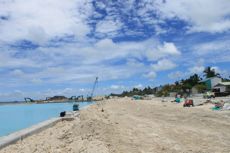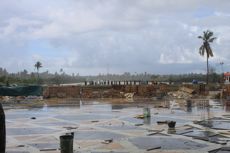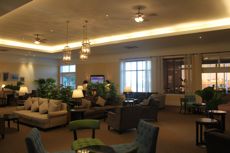This story was originally published on Minivan News’ spin-off travel review site, Dhonisaurus.com.
With tourism authorities committed to branding the Maldives as a luxury destination, the establishment of guest-houses for independent travellers is presently seen as more of a niche “bonus” for the country’s economy, rather than an up-and-coming business model.
The Ministry of Tourism, Arts and Culture, currently in the process of attempting to claw back consumer confidence in the destination damaged during the early months of 2012, is also in the process of outlining a fourth long-term master plan for pursuing growth within the Maldives travel sector.
As part of these plans, government officials have said they are presently analysing the contribution to the economy of all tourist properties – including resorts, safari boats and guest-houses – before unveiling how each sector will be developed in the future.
While the demand for experiencing guest-houses on the Maldives’ inhabited islands is said to be comparatively “low”, one expert providing independent holiday experiences in the country has said there was interest nonetheless in providing options for backpackers and budget holidaymakers.
As a Muslim traveller first arriving to the Maldives in early 2011, Raki Bench was looking for alternatives to the country’s well publicised island resort experience. Bench, an internet marketing specialist by trade, said that after asking around at what was then Male’ International Airport, he found it was possible with perseverance to negotiate an escape to a local guest-house or even a stay on a desert island.
“We didn’t want to go to a resort and were interested instead in guest-houses and experiences with local people,” he said.
However, when considering the country’s strictly Islamic society, which outlaws certain holiday staples travellers may take for granted at other destinations – like wearing bikinis and purchasing alcohol – Bench said that catering for the needs of holidaymakers outside the Maldives’ resorts was not without its challenges.
Aside from cultural sensitivities, he pointed to several logistical and transport issues, as well as a lack of government support in recent years for the sector, as key concerns holding back the development of the guest-house industry.
Yet almost a year and a half after first arriving to the country, Bench is now the founder of the Guest-houses in Maldives website, which offers specially prepared packages to tourists from all over the world looking for a more budget-friendly, independent holiday experience.
“We find that the business caters for a mix of more budget-focused travellers and also those looking to explore the natural environment in the country. Since 2011, we have started to get interest from families wanting to come to the Maldives on a budget,” he said.
“At present, our main customer-base are Europeans for sure, there are a lot of backpackers staying in Sri Lanka for instance with an interest in coming over to the Maldives for a few days to stay in guest-houses. We also receive some requests from countries like Singapore, but Asia is not our main market.”
The magic number
As the Maldives this year aims to attract a total of one million holidaymakers to its islands, Bench stressed that the country’s reputation as a luxury destination underlined that fact that the guest-house model would not cater for everyone’s tastes.
He added that in recent years, despite previous government commitments to provide more mid-market accommodation for visitors wanting to explore the country’s inhabited islands, further support had been lacking.
“The government has not really been helping guest-houses at all. It is a small sector, but it is showing growth within the wider tourism industry. I don’t see any promotion from authorities,” added Bench, who said he was realistic about the economic reasons for this.
“I do understand why this is the case. After all what is the point in promoting an industry with a value of US$50 a night when you compare that to what resorts can make.”
According to recently published official travel industry figures, the number of bed nights recorded at Maldives guest-houses during January 2012 was up 17.3 percent to 2,867 compared to the same period in 2011.
Over the same period, 622,944 bed nights were recorded by the country’s resorts. Bed nights are used by the hotel industry as a measure of occupancy per person per night.
While the actually occupancy rate of guest-houses was also found to have increased by 2.8 percent in January 2012 over 2011, guest-house accommodation was found to be only at 20 percent of total capacity, according to the statistics.
Bikini restrictions
From his own experience, Bench said that as the country’s current crop of guest-houses had opened in recent years, not all their proprietors were perhaps experienced in running a travel business – meaning properties were not always being used to their full potential.
“My advice to guest-house owners would be to try and think of the problems they will face,” he said. “Think if there will be daily transfer to your island, think of the restrictions on wearing bikinis on local beaches, therefore is there a resort or private beach nearby?”
Both through his own website, and working as a guest-house product manager for the Maldives Dive Travel company, Bench said that he only offered customers full-board packages. He claimed this was important decision, both as a means to provide the best value for money, but to also overcome the potential challenges in hosting foreign guests.
Taking a typical day staying at a guest-house as an example, Bench said that upon waking up and having a traditional breakfast prepared by their hosts, visitors would then be offered a choice of excursions from diving or surfing, to spending a day aboard a liveaboard boat, private island or even a resort.
“The main reason for this is to leave the island to overcome bikini restrictions. All people who book with us are offered excursions due to the restrictions imposed under local laws,“ he said.
Bench claimed he also aimed to ensure guests booked excursions in advance, as arranging trips such as reef snorkelling or a day on a private beach once staying at a guest-house could prove much more costly.
“You can often find a room yourself at guest-houses for around US$70, which is cheap, but you need to be aware of the regulations and some of the hidden charges that are there,” he said.
Adapting
Despite cultural and legal restrictions on the wearing of bikinis and selling alcohol on the inhabited islands where guest-houses are based, Bench said that increased booking numbers, particularly from European tourists, highlighted that holidaymakers were adapting to the unique nature of more independent travel in the Maldives.
“The increased bookings seen at guest houses in general shows that people are adapting to local cultures during their stay and we haven’t faced too many problems in this regard,” he said.
Aside from guest-houses, with the Maldives’ territories estimated to be comprised of over 90 per cent water, it is perhaps not surprising the safari boats – with their cabins and trained dive staff – have also become an important part of the development of mid-market travel in the Maldives.
Maldives Dive Travel, a company Bench also represents, has itself begun offering guest-house experiences to customers along with its traditional liveaboard voyages, allowing the chance to combine a stay both above the water and on the country’s inhabited islands.
However, Bench said that as a wider industry development, collaboration in the country between safari boat operators and guest-house owners that would allow greater mobiltiy between local islands presently appeared far from viable.
“I know we have thought about combining voyages on safari boats and allowing guests to travel to different islands before. But the only real solution for this would be if a liveaboard boat had the same owner as guest-houses,” he said. “Logistically, for foreign companies like us, this would be impossible to arrange, the infrastructure is not there.”
Bench added that while the Maldives’ laid back island culture was extremely appealing for guests on holidays, a similar attitude sometimes found to be adopted within the country’s ministries and administrative offices also hampered coordination between different industries and sectors.
“Love and nurturing”
Adrian Neville, a veteran of travel writing in the Maldives, told Dhonisaurus that guest-houses had played a role in the development of the country’s holiday industry since being founded in 1972. However, the properties were abruptly closed for many years as of May 1, 1984.
“This was pretty much directly at the behest of the resort owners for obvious reasons and on the spurious grounds of social problems and the wrong type of tourists,” he said. “Of course, now those wrong types are just fine – now they are not ‘hippies’ but ‘independent travellers’.”
While guest-houses had been reintroduced back in 2008, Neville contended that he was not sure whether the general attitudes of resort owners in the country would have changed much, particularly in terms of supporting the fledgling industry.
“The sector is up and running, but it is a weakling in need of love and nurturing,” he said.
Neville claimed that while there was clear interest in the further development of a guest-house sector to allow independent travellers to take in the Maldives, the country’s long-term segregation of tourists from local communities may also serve to limit the potential.
“There is sufficient interest but it won’t grow quickly until the issue of separation or, most unlikely for the foreseeable future, co-habitation with different lifestyles, is resolved,” he said.
According to Neville, there was one key challenge that he ultimately believed would hold back the wider development of guest-houses and opening up independent travel up to tourists.
“Transport. Transport. Transport,” he added. “The ferry system is a sine qua non. A no brainer and a great idea but sadly it has died, withered on the vine as it tried to establish itself. The economic plan to make it happen turned out not to be viable,” he said. “Until this is reworked not enough is being done to open [guest houses] up to tourists.”
Master plan – version 4.0
Ahmed Adheeb, the recently appointed Minister for Tourism, Arts and Culture, said that provisions allowing guest-houses to cater for tourists were provided under law back in 2008.
However, with the government of President Mohamed Waheed Hassan having replaced Mohamed Nasheed’s administration earlier this year, tourism authorities have said they were now in the process of devising an overall tourism plan that would include potential developments for independent travel.
Adheeb said that it was presently difficult “to say where we stand on guest-houses” as the industry was still relatively niche compared to the established resort market.
“The Maldives continues to be branded as a luxury destination within the tourism market. It is a bonus therefore that these guest-houses allow us to supply mid-market demand,” he said.
With the Ministry of Tourism of Tourism, Arts and Culture working with bodies like the World Tourism Organization (UNWTO) on the development of a fourth national “master plan” for outlining tourism industry developments, the exact nature of diversification was as yet undecided. The third master plan was concluded last year.
“We are formulating our plan right now. This will look specifically into how many guest-houses have been built and how they contribute to the economy,” he said.
Adheeb said that he would be also be looking at quality standards as well as issues of security at more independent properties as part of the master plan before divulging how the government might look to support and promote guest-houses.



